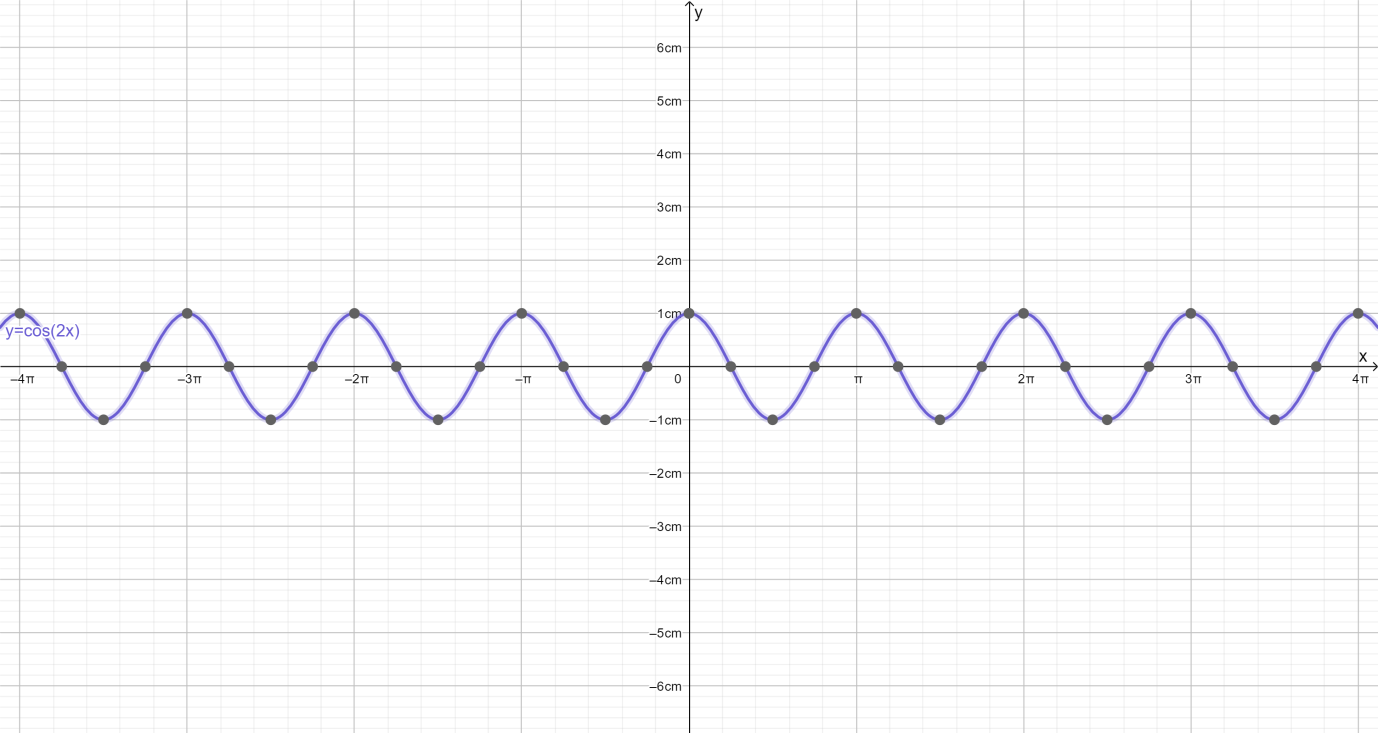Question
Question: How do you graph \(y = \cos 2x\)?...
How do you graph y=cos2x?
Solution
First find amplitude, period, phase shift, and vertical shift for given periodic function. Select a few points to graph. Find the point at x=0, x=4π, x=2π, x=43π, x=π. List the points in a table. Then graph the trigonometric function using the amplitude, period, phase shift, vertical shift and the points.
Formula used:
Period: The period goes from one peak to the next (or from any point to the next matching point).
Amplitude: The amplitude is the height from the center line to the peak (or to the trough). Or we can measure the height from highest to lowest points and divide them by 2.
Phase Shift: The phase shift is how far the function is shifted horizontally from the usual position.
Vertical Shift: The vertical shift is how far the function is shifted vertically from the usual position.
Complete step by step answer:
Use the form acos(bx−c)+d to find the amplitude, period, phase shift, and vertical shift.
Compare the given equation y=cos2xwith acos(bx−c)+d and find variables a,b,c and d.
a=1, b=2, c=0 and d=0.
Find the amplitude ∣a∣.
Here, a=1.
Amplitude, ∣a∣=1.
The period of the function can be calculated using ∣b∣2π.
Period: ∣b∣2π
Replace b with 2 in the formula for period.
Period: ∣2∣2π
The absolute value is the distance between a number and zero.
The distance between 0 and 2 is2.
Period: 22π
Cancel the common factor of 2.
Period: 22π
Divide π by 1.
Period: π
Find the phase shift using the formula bc.
The phase shift of the function can be calculated from bc.
Phase Shift: bc
Replace the values of c and b in the equation for phase shift.
Phase Shift: 20
Divide 0 by 2.
Phase Shift: 0
Find the vertical shift d.
Vertical Shift: 0
Now we have to List the properties of the trigonometric function.
Amplitude: 1
Period: π
Phase Shift: 0(0 to the right)
Vertical Shift: 0
Also, we select a few points to graph.
Find the point at x=0.
Replace the variable x with 0 in the expression.
f(0)=cos(2(0))
Multiply 2 by 0.
f(0)=cos(0)
The exact value of cos(0) is 1.
⇒f(0)=1
The final answer is 1.
Find the point at x=4π.
Replace the variable x with 4π in the expression.
⇒f(4π)=cos(2(4π))
Cancel the common factor of 2.
Factor 2 out of 4.
⇒f(4π)=cos(2(2(2)π))
Cancel the common factor.
⇒f(4π)=cos(2(2×2π))
Rewrite the expression.
⇒f(4π)=cos(2π)
The exact value of cos(2π) is 0.
⇒f(4π)=0
The final answer is 0.
Also, we have to find the point at x=2π.
Replace the variable x with 2π in the expression.
⇒f(2π)=cos(2(2π))
Cancel the common factor of 2.
⇒f(2π)=cos(2(2π))
Rewrite the expression.
⇒f(2π)=cos(π)
Apply the reference angle by finding the angle with equivalent trigonometric values in the first quadrant.
Make the expression negative because cosine is negative in the second quadrant.
⇒f(2π)=−cos(0)
The exact value of cos(0) is 1.
⇒f(2π)=−1×1
Multiply −1 by 1.
⇒f(2π)=−1
The final answer is −1.
Again, we have to find the point at x=43π.
Replace the variable x with 43π in the expression.
⇒f(43π)=cos(2(43π))
Cancel the common factor of 2.
⇒f(43π)=cos(2(2(2)3π))
Cancel the common factor.
⇒f(43π)=cos(2(2⋅23π))
Rewrite the expression.
⇒f(43π)=cos(23π)
Apply the reference angle by finding the angle with equivalent trigonometric values in the first quadrant.
⇒f(43π)=−cos(2π)
The exact value of cos(2π) is 0.
⇒f(43π)=0
The final answer is 0.
Find the point at x=π.
Replace the variable x with π in the expression.
⇒f(π)=cos(2(π))
2π is a full rotation so replace with 0.
⇒f(π)=cos(0)
The exact value of cos(0) is 1.
⇒f(π)=1
The final answer is 1.
List the points in a table.
| x | f(x) |
|---|---|
| 0 | 1 |
| 4π | 0 |
| 2π | −1 |
| 43π | 0 |
| π | 1 |
The trigonometric function can be graphed using the amplitude, period, phase shift, vertical shift and the points.
Amplitude: 1
Period: π
Phase Shift: 0(0 to the right)
Vertical Shift: 0
| x | f(x) |
|---|---|
| 0 | 1 |
| 4π | 0 |
| 2π | −1 |
| 43π | 0 |
| π | 1 |

Note: cos2x and 2cosx are entirely different terms.
2cosx is twice the cosine of angle x. It lies between −2 and 2.
cos2x is the cosine of angle 2x. It is two times the angle x. The value of cos2x is between −1 and 1.
